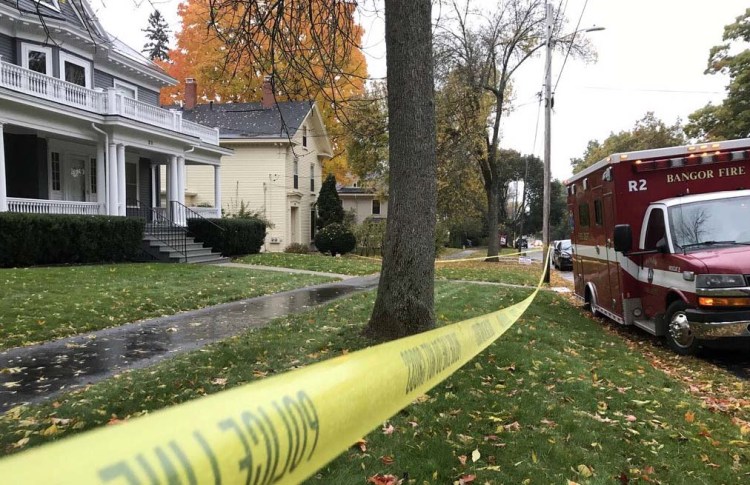Federal and local police are investigating a letter sent Monday to Sen. Susan Collins’ Bangor home that the writer claimed contained the deadly toxin ricin, an act Collins’ office said was the latest in a series of threats against the senator in the wake of her vote to confirm Supreme Court Justice Brett Kavanaugh.
“Senator Collins’ husband, Tom Daffron, today received a threatening letter that the writer claimed was contaminated with ricin, a highly hazardous substance which was used in a previous attack against the United States Senate,” Collins spokeswoman Annie Clark said in a statement Monday night. “Mr. Daffron, their dog, and parts of their home were quarantined while the crime lab undertook an analysis of the premises. The affected areas have now been cleared, and Senator Collins and Mr. Daffron will be able to remain at home tonight.”
#BREAKING: Police on scene of @SenatorCollins home in Bangor investigating a ‘suspicious letter.’ I’m told Collins’ husband was at the home, and she is now on her way home from Washington. https://t.co/atwBpGaE2u #NEWSCENTERmaine pic.twitter.com/Ftowr1v1Re
— Zach Blanchard (@ZachBlanchard) October 15, 2018
Bangor police received a report of the suspicious letter at 1:39 p.m., and teams of investigators and a hazardous materials team from Orono were soon on scene at Collins’ home on West Broadway. Photos and television footage showed a large area around Collins’ gray house cordoned off with yellow police tape and several officers wearing protective suits.
“The testing of the letter, as well as the investigation into its origins, remain ongoing,” Clark’s statement said. “Today’s incident is the latest in a series of threats against Senator Collins, her loved ones, and her staff.”
Collins had been in Washington, D.C., when the letter arrived and had returned to Bangor by Monday night.
“We are very grateful for the immediate and professional assistance that we received from the Bangor Police Department, the Maine Crime Lab, the Maine State Police Department, the Capitol Police, the FBI, the Orono Hazmat Unit, the Bangor Fire Department, the U.S. Army, and the U.S. Postal Inspection Service,” Collins and her husband said in a joint statement Monday night. “We are also truly appreciative of the many well wishes that we received today. Our friends and neighbors have been incredibly kind and have even offered to open their homes to us. We feel blessed to live in such a supportive community.”
Earlier in the day, Bangor police said the letter did not pose a threat to public safety.
“Currently, we have no information to suggest the public at large is in any danger whatsoever,” Bangor police Sgt. Wade Betters said during a briefing Monday afternoon.
On Monday evening, the FBI issued a statement confirming that assessment.
“The FBI along with our law enforcement partners responded to a suspicious letter sent to Senator Collins’ home in Bangor, Maine,” Kristen Setera, the spokeswoman for the FBI’s Boston Division, said in the statement. “At this time, preliminary testing has indicated there is no threat to public safety in connection with this mailing. We encourage the public to remain vigilant and report any suspicious activity to law enforcement.”
Although Bangor police were the primary responding agency, the U.S. Capitol Police received the initial call about the letter, and it will be the Washington, D.C.-based law enforcement agency along with the FBI that will take the lead in investigating the matter, Setera said.
Collins has been the subject of intense pressure leading up to her decisive vote to confirm Kavanaugh after allegations by multiple women that Kavanaugh sexually assaulted them in high school or college.
Prior to Collins announcing her vote on the Senate floor on Oct. 5, her office in Portland and at the Capitol were the site of frequent protests, and her staff said they’d received threats regarding her position on the nominee.
Dozens of protesters were arrested outside Collins office in Washington, D.C., including some Mainers who traveled to Washington in an attempt to meet Collins and participate in the demonstration.
In Portland, another band of activists organized a sit-in at Collins’ home office, which also was the site of graffiti scrawled on a nearby wall urging Collins to reject Kavanaugh.
This is not who we are – as a state or as a nation. Regardless of any political differences, @SenatorCollins, her family, and her staff should not have to be subjected to these threats – there’s just no place for it in our discourse. https://t.co/K0Xq7qygrb #mepolitics
— Senator Angus King (@SenAngusKing) October 15, 2018
Sen. Angus King tweeted his support for his colleague and her family on Monday night, decrying the hyperpartisanship that leads to such acts.
“This is not who we are – as a state or as a nation. Regardless of any political differences, @SenatorCollins, her family, and her staff should not have to be subjected to these threats – there’s just no place for it in our discourse,” King tweeted.
It was not clear when the letter was delivered or by what means. If it was sent through the U.S. Postal Service, mailing the letter could constitute a federal crime.
Setera said her agency would have no further comment on the matter since it is agency policy not to comment on ongoing investigations.
Capitol Police also declined to comment, citing the ongoing investigation.
Portland police wouldn’t say whether they had stepped up security at Collins’ Portland office in response to the suspicious letter sent to her Bangor home.
It is department policy to not discuss security or security protocols, Lt. James Sweatt said, adding “this includes Sen. Collins or any of her offices.”
Staff Writer Dennis Hoey contributed to this report.
Matt Byrne can be contacted at 791-6303 or at:
mbyrne@pressherald.com
Twitter: MattByrnePPH
Send questions/comments to the editors.




Comments are no longer available on this story